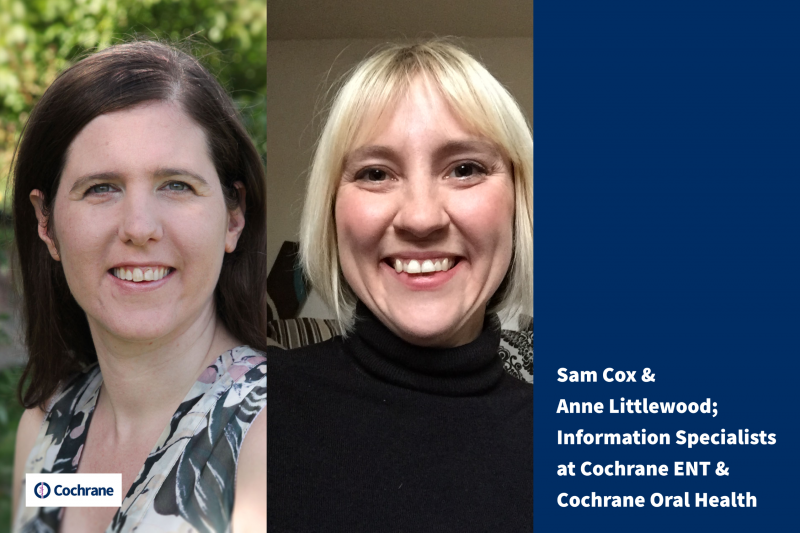

Information specialists within Cochrane generally work with their review authors and editorial staff, but rarely have a chance to work with another information specialist to produce a search strategy, or to collaborate on a review.
Samantha (Sam) Cox (Information Specialist at Cochrane ENT) and Anne Littlewood (Information Specialist at Cochrane Oral Health) report their experience of working together on three new Cochrane reviews.
The COVID-19 pandemic has brought unprecedented challenges to health-care providers. Both ENT specialists and the dental care teams face similar issues in the mitigation of aerosol-generating procedures (AGPs). Two Cochrane Review groups in the Musculoskeletal, Oral, Sensory and Skin (MOSS) Network (Cochrane ENT and Cochrane Oral Health) decided to join forces to co-produce evidence for three new reviews looking at whether mouth rinses and nasal sprays can reduce viral load before AGPs, the first co-produced reviews on the Cochrane Library.
Cochrane ENT is based in Oxford, UK, and Cochrane Oral Health is based in Manchester, UK. Editors from both groups came together via virtual meetings at an early stage in the pandemic to discuss how they could produce reviews of relevance to their stakeholders, and how this would work in practice. An author team was established from the two editorial bases. We also met to discuss how to work together to support the process in our roles as information specialists. We discussed:
- Where we might search for evidence;
- How we might design the search strategy;
- Who would do the searches;
- How we would write up the search methods in the protocol and final reviews

Designing the search
A rough draft of the protocol for what would develop into the three reviews had been produced by the authors; and we spent some time discussing whether to do one over-arching search to cover all three reviews, or whether each review should have it’s own search. We decided that as COVID-19 is such a new disease, one search to cover all three reviews was going to be adequate, although we might revisit that decision for updates as the evidence base develops.
We each talked to our respective teams about which agents might be used as mouth rinses and nasal sprays; Sam from an ENT perspective, and Anne from an Oral Health perspective. We then took the resulting list and did more research into the various terms and synonyms that might be used for each agent, splitting the work between us. Sam then developed a search in Ovid MEDLINE to share with Anne, and we discussed and refined it further. We sent that search to be peer reviewed by an information specialist colleague and actioned the resulting changes.
We also talked to the author team about where to search and developed a list of sources that might be useful. We ran test searches across some of these to see if searches would be practical and whether they were likely to yield results.
The reviews were to be done as quickly as possible, so we had to limit our searches to databases and resources that would be productive and allow us to send results to the authors quickly. After discussion and feedback, we settled on five sources: CENTRAL, MEDLINE, Embase, the World Health Organization (WHO) COVID‐19 Global literature on coronavirus disease database and Cochrane’s COVID-19 Study Register.
As the editorial process was managed by the ENT group, Sam wrote up the protocol search methods and shared with Anne for checking and feedback.
Running the searches
To facilitate the rapid review process, we undertook the searches before publication of the protocol. Sam had already entered the draft search strategy into MEDLINE, so she ran the search, and sent the results to Anne, who searched the other four databases and collated the results. The results were documented and shared with Sam and the author team. One update has been run since then, so that the results could be as up to date as possible before the publication of the three reviews. Sam then wrote up the search methods for the final reviews and dealt with requests for papers and referencing.

Working together
This collaboration of information specialists was a really positive experience. We worked well as a team, dividing tasks and discussing each stage. We believe that the search methods for these reviews are stronger as a result. We were able to meet practical difficulties, for example, because there were two information specialists involved, we could ensure that one of us was always present at the regular weekly meetings of the author team to discuss these reviews. This improved communication with the authors, and we kept in touch with each other to feedback any important developments. It also enabled us to respond quickly throughout this expedited process. Tasks could be assigned to the person who was available at the time and meant that we could support the rapid production of timely Cochrane Evidence.
We think that this is a great example of how Cochrane groups can work together in their Networks to co-produce evidence, and how members of the editorial team can share responsibilities
The three completed reviews were published on the Cochrane Library on 16 September 2020:
- Antimicrobial mouthwashes (gargling) and nasal sprays to protect healthcare workers when undertaking aerosol-generating procedures (AGPs) on patients without suspected or confirmed COVID-19 infection
- Antimicrobial mouthwashes (gargling) and nasal sprays administered to patients with suspected or confirmed COVID-19 infection to improve patient outcomes and to protect healthcare workers treating them
- Use of antimicrobial mouthwashes (gargling) and nasal sprays by healthcare workers to protect them when treating patients with suspected or confirmed COVID-19 infection
They were the first Cochrane Reviews published jointly by two Cochrane Review Groups in the Cochrane Library.
Post publication
Anne took responsibility for PICO annotating the three reviews, so the annotations appeared on the Cochrane Library as soon as the reviews were published. Both Anne and Sam were involved in discussions about how to disseminate the reviews. Anne wrote a blog and Anne and Sam tweeted the reviews from their Group’s respective Twitter Accounts: @CochraneENT and @CochraneOHG
Anne and Sam will continue to work together to keep these reviews up to date, as evidence to answer these important clinical questions are published

